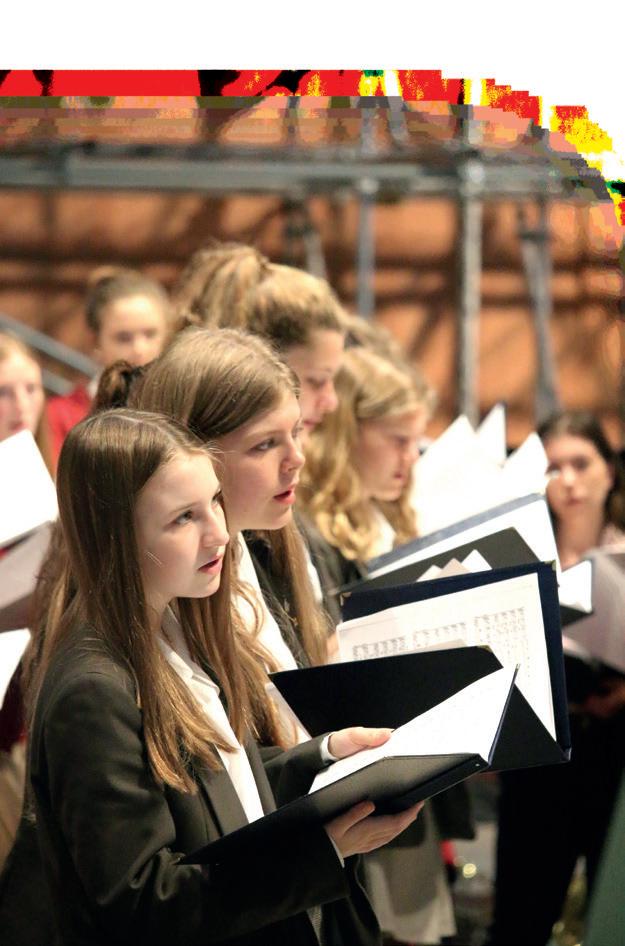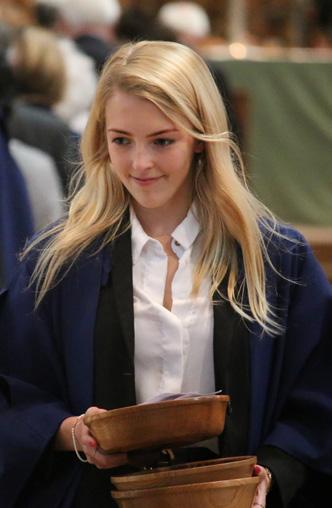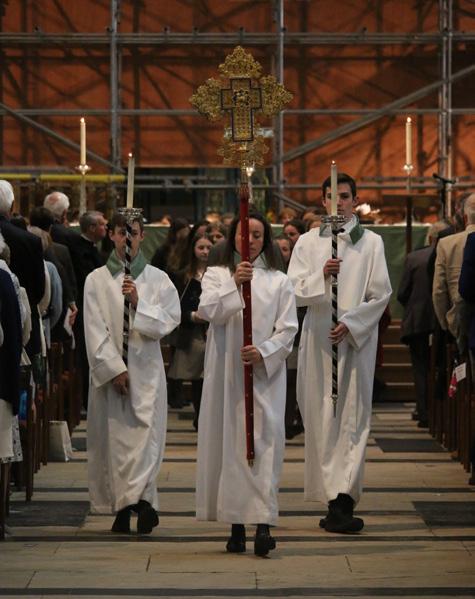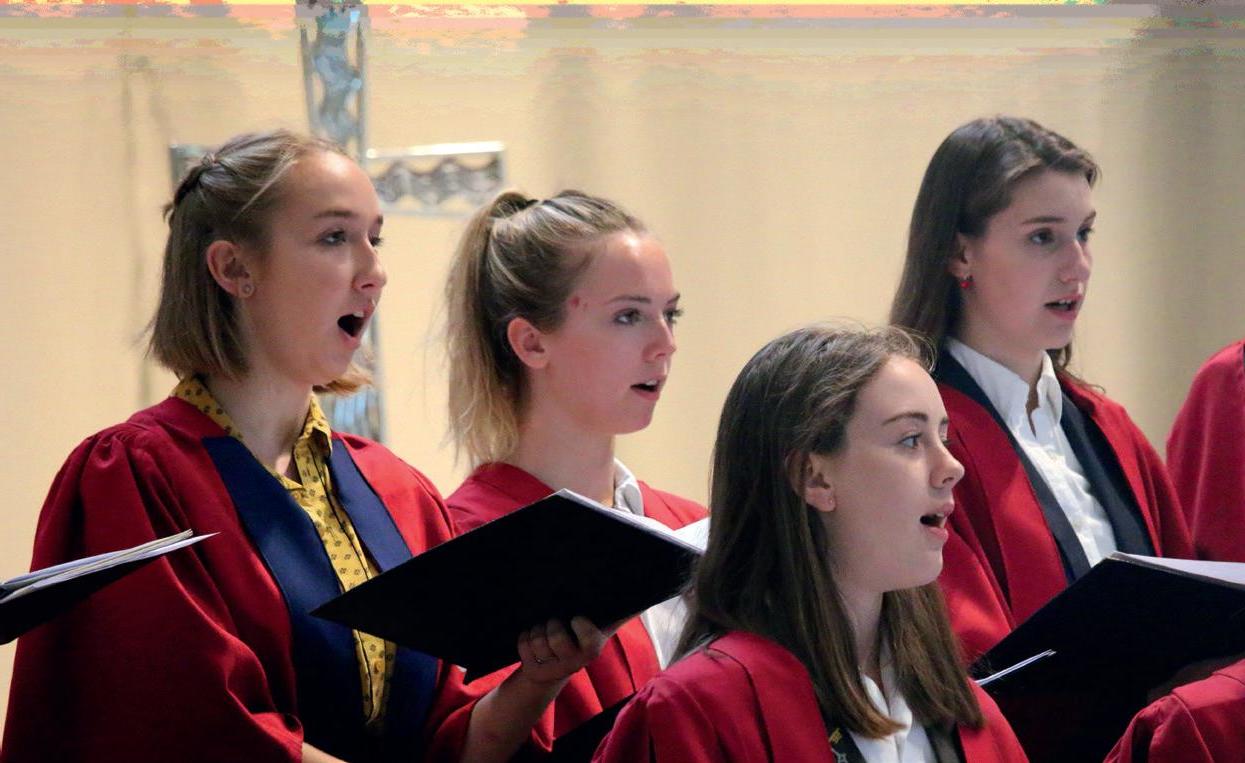
15 minute read
COMMEMORATION
The Head Master’s Address
We live in a remarkable world of scientific, medical and technological advances where humans go faster, higher and stronger than ever before. Most of us carry in our pockets a device with greater capacity than the technology which first put humans on the moon fifty years ago this month. I don’t think I am that old, or perhaps I just don’t want to think that I am old, but in 1996 when I began teaching I had no mobile phone, no email address and in my classroom I had a blackboard and chalk.
In 1992 the American political scientist Francis Fukuyama published an article called The End of History in which he asserted that following the Cold War and the collapse of the Soviet Union, humanity was reaching “the end of history. That is, the end point of mankind’s ideological evolution and the universalization of Western liberal democracy as the final form of human government.”
Fukuyama’s claim is now considered alongside other famously inaccurate predictions such as the president of IBM saying in 1943 that he considered there might be “a world market for maybe five computers” or Time magazine’s confident assertion in 1966 that “remote shopping, while entirely feasible, will flop”. Indeed deep questions have been raised as to whether liberal democracy is even working in the West as we look at the state of politics in the US, the great schism caused by the 2016 EU referendum and a process whereby 330 MPs and approximately 160,000 members of the Conservative party will elect our next Prime Minister. So if advances and events of recent years have shown us that futurology is an imprecise art, what does this mean for education and what does it mean for us at St Peter’s? For a school as old as ours it could be that, as the old musical says, like “old man river” St Peter’s just keeps rolling on. There is of course some truth to that but St Peter’s has never simply just kept rolling on. Over the centuries, the school has changed, evolved and adapted to the growing needs of a changing world but there remains a thread of continuity that, like a rich seam of gold, runs through time. Education has never just been about the imparting of knowledge or the giving of information from one person to another. This can be seen in the roots of the very word education where the Latin ‘educere’ means a drawing out not a putting in. It is true that we cannot know the future for which we are preparing children but when can that have ever honestly been said?
What is certain is that great opportunities will exist for those who are prepared to take them.

As life is very complicated sometimes it is better to distil it into simple ideas and a key concept is that we are not producing 18-yearolds but rather thinking ahead to the young people sitting in the Minster today as successful adults in their middle and late ages. If we start from that premise and consider what makes somebody happy, confident, successful and fulfilled later in life we know that it requires a wide range of skills, interests and values. We also know that it starts with examination results especially in our qualification driven society where attaining the best grades possible is a crucial link to the next stage in life after school.
Last summer’s strong A Level and GCSE results with a healthy increase on the previous year demonstrate that in this key area our pupils and their teachers have the capacity for great achievement. But attaining top grades never comes about through simple rote learning and regurgitation and one of the hallmarks of our approach is to nurture a sense of personal engagement in and love for learning. This is of course seen in the classroom but also through a wealth of other academic endeavours and this is key as we spend most of our professional lives problem solving, researching, refining ideas and working in collaboration with others in ways that go far beyond the techniques required to perform in the UK’s traditional approach to taking examinations.
In academic extension, we were crowned regional Schools Challenge winners for the third year in a row, the Junior and Senior Debating Societies are thriving and we were one of three schools in the country to receive an award for our work in outreach and hosting competitions in Public Speaking.
Meanwhile a group of Business Studies pupils reached the national finals of a competition run by the Institute of Chartered Accountants and a team of pupils in Economics beat off competition from 25,000 pupils across the country to make the national finals of the Student Investor Challenge.
Closer to home, we hosted the North Eastern heats of the Modern Foreign Language debating competition in the new Pascal building with our teams in French and German making the final and the Spanish team winning their event.
Such opportunities do much to enrich our pupils and encourage a love of learning and the chance to step out of the tramlines of exam specifications. For example, we were regional winners and national finalists in the UK Senior Mathematics Challenge with Gold and Silver Awards in national Physics and Chemistry Olympiads.
Academic results are the foundations to the life of a successful adult but not the whole picture. We all know that while exam results get you a job interview it is the person who walks through the door who gets the job and that makes it a necessity to provide as many opportunities as possible to develop skills and interests which are not always developed through examinations.
This is achieved in a multitude of ways outside the classroom and one of the many appeals of St Peter’s is the commitment to a broad co-curricular life where we seek to balance developing individuals as far as they can go while also aiming for the broadest sense of inclusion and engagement. As one colleague said to me, St Peter’s is a place where you can be yourself and become yourself and another used a phrase which I found particularly telling, “We aim for excellence not elitism”.
The great thing about this approach to education is that it also makes life a lot more fun and interesting. In a world where the notion of retirement seems to be a thing of the past, having a full and rich life has never been more important.


There are boundless examples over the last year in music with many concerts and competitions although the highlight would have to be the Chapel Choir reaching the final of the National Choral Competition at the Royal Festival Hall in March – the first time one of our choirs has reached that stage.
More and more pupils are taking Duke of Edinburgh Awards with 75 of the current Third Form completing Bronze this year and 40 completing Silver and Gold, and of course it is not just about the expeditions but also the diverse range of volunteering activities that our pupils have organised which is really heartening and inspiring.
Drama has given incredible experiences for many of our pupils, staff and parents. Beauty and the Beast will live long in the memory and while there were a host of individual performances, one thing which really struck me was the way it drew on pupils and staff onstage and backstage. To witness all of that coming together in a number such as ‘Be Our Guest’ with forty pupils dancing and singing on stage from Belle to a variety of napkins demonstrated astonishing levels of brilliance and teamwork.
Teamwork has also been seen in abundance in what has been an outstandingly successful year for sport. The success of sport has seen St Peter’s hit the national consciousness in several ways not least through the Rosslyn Park National Schools Rugby Sevens Tournament. Our U16 team garnered enormous interest and respect from neutral supporters as they progressed past several schools with big sporting reputations to become national Colts Champions for the first time ever in the history of St Peter’s.
We have enjoyed great success also in girls’ and boys’ sports in county and regional competitions across hockey, netball, swimming and water-polo where we were semi-finalists in the English Schools’ Cup. Staying on the water, the rowers have won races in several regattas. In cricket, the Under 15s are Yorkshire T20 champions and the 1st XI reached the North of England final and won the Repton Festival. History was also made with an inaugural Junior Summer Smash and other fixtures for our girls’ cricket team – something I was delighted to see and clearly something which is here to stay.
In tennis, the girls were winners of the York League at Under 14, 15 and 18 level with the Under 15s continuing into the national knockout rounds in September, and they had success in the National Schools Competition, including finalists in the Senior Girls’ Plate Competition. Meanwhile, the boys have had an excellent season with the highlight being the First Team reaching the National Tennis Finals at the end of the Spring Term. Only 8 Schools qualify from across Great Britain out of 250 who enter and it is notable that this is only the second time ever that the School has reached this stage.
All these examples give something of a flavour of the last year at St Peter’s and our growing reputation nationally is a good thing in itself but what has really impressed me and made me proud, has been seeing the way in which St Peter’s can be and is a key player in York and Yorkshire. St Peter’s is a highly sociable and outward-facing school and perhaps this should not be a surprise given our origins in the Benedictine tradition of offering hospitality, and my family and I have certainly felt enormously welcomed since my appointment last March.
That instinctive sense of openness and wanting to share with others permeates our daily lives and is made visible in our engagement in the York Independent State Schools Partnership. Along with that, our Public Lecture series and links to the Literature Festival and Festival of Ideas all bring great cultural opportunities as well enabling us to play a part in the astonishingly vibrant life of York.
That sense of being part of something greater than ourselves and of the importance of service to others lies at the heart of some of the deepest learning at school. When we think about what really sets apart those people we admire and respect the most from others, it is a strong and tangible sense of moral values and virtues. Much of that is lived through our daily lives where we celebrate that which is good, pure, noble and virtuous, and correct that which is not. After all, no teenager ever got to the age of eighteen without making mistakes and adolescence is sometimes more of a meandering pathway than a straight line graph.
We are fortunate in having Chapel at the centre of our lives and have been treated to some outstanding addresses this year and it is wonderful to celebrate our historic ties with the Minster both in being here today and in so many other ways. As well as the day to day, there are also events such as Volunteering Week for the Fifth Form and Mencap Day for the Third Form, and of course this year was Red Nose Day and what an astonishing sight to see the whole school in fancy dress. Particular hats off to the Upper Sixth coming dressed as gilet jaunes protestors from France and celebrating the history of political insurrection at St Peter’s since 1605 AD.




It has clearly been an excellent year for St Peter’s and this was reflected in our being named in October as The Sunday Times top independent school in the North of England in recognition of the outstanding opportunities outside the classroom alongside academic excellence. In terms of continuing to invest in facilities, the completion of the Pascal Building has given us high quality teaching spaces for Maths and MFL, and independent learning space for Sixth Formers. The Pascal building was announced as the winner of the York Design Award for public and community use and hats off to our phenomenal support staff for their deft management of such a complex project.
Looking ahead, the school is in strong shape with excellent foundations on which to develop and ensure we give current and future generations of Peterites the best preparation for a fastchanging world while drawing on our long history and heritage.
We will be focusing on the flow of education from three to eighteen across all three schools while ensuring that we continue to give each stage and age the distinctiveness they need and deserve, and we are also looking to the longer-term and future affordability with work on an overseas school being one element of that strategy. We have a shared anniversary with the Minster in 2027 and preparations are beginning to mark the 1,400th anniversary of our foundation with events and the potential to increase our capacity for bursaries and help with fees.
Since January, I have been meeting with and listening to pupils and colleagues and over the next year we are making developments to the Sixth Form general programme, improving our teaching of IT skills as well as continuing a focus on pastoral development through tutoring, PSHE and particular emphasis on positive mental health and well-being. In the last two terms, a pupil led Eco-Schools Committee has been formed and that has tremendous potential for improving our environmental impact not least in areas such as waste,



recycling and aiming for a significant reduction in single-use plastic bottles and other items.
None of this would be possible without an astonishing team of people and this is an ideal opportunity for me to publicly thank everyone who has supported me in settling into my time at St Peter’s. In particular to Leo Winkley for his courteous and supportive handover and to Dr Dunn for his time as Acting Head Master and role as Senior Deputy Head. To the Governors for their commitment to the school’s success, wise counsel and expertise and a special thank you to Margy Hayward who steps down after ten years as a Governor. Our wonderful support staff for ensuring the day to day smooth running of the school and to my incredible colleagues on the teaching staff who show such dedication, enthusiasm and flair. On behalf of everyone here, I wish you a happy and restorative break over the summer with much to look forward to next year.
Particular thanks go to those colleagues who are leaving St Peter’s. Max Weber our German Assistant this year returns home for teacher training. Emma Greenhalgh who joined us in 2014 moves on to teach Chemistry at Harrogate Ladies College. Jo Lawrence, who moves to a new role with English Heritage after teaching English for 26 years, including being Head of Department at both St Olave’s and St Peter’s. Richard Wallace who retires after 30 years as a teacher of Design Technology. Mike Duffy who joined in the year 2000 retires as Head of MFL and Joanna Wright, Deputy Head Pastoral moves on after nine years at St Peter’s to be Head of King Edward’s School, Witley. Finally, we say farewell to Barry Gill who joined St Peter’s in February 1978 as Chemistry Technician and moves into retirement after nearly forty years of service – a quite remarkable achievement.
Thank you for all you have done during your time at St Peter’s and I wish you every happiness and success in all that lies ahead.
Thank you to our parents for all your support of and engagement with the school and to the pupils who make every day so worthwhile, busy and exciting. Have a fantastic summer and use the opportunity wisely to continue to grow, develop and nurture your interests.
Finally to the Upper Sixth – a huge thanks for your welcome to me. My only regret is that I have not had more time with you but I hope that we will continue to be in contact as you leave the Minster today as young Old Peterites. You can be enormously proud of all you have achieved and confidence in all that lies ahead. Your incredibly witty and perceptive analysis of the senior leadership team’s management styles would put top consultancy firms to shame and I have a strong sense that you will go on to achieve great things. But remember that from those who have given much, much will be expected. You have the opportunity to capitalise on all you have learned at St Peter’s not just for personal success but to make a difference to your communities, in your relationships and in your world. Keep your playful sense of humour, it will sustain you through the good and bad times. Life moves pretty fast – make sure you make the most of it and above all, always do what is right, not what is easy and may God bless you all.
Mr Jeremy Walker Head Master











